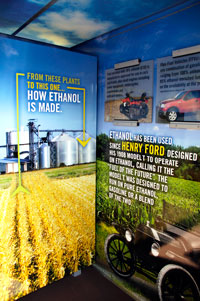 Biodiesel-powered vehicles were the dominating force during this year’s Challenge X… a four-year engineering competition with 17 university teams from across North America developing General Motors vehicles using alternative energies.
Biodiesel-powered vehicles were the dominating force during this year’s Challenge X… a four-year engineering competition with 17 university teams from across North America developing General Motors vehicles using alternative energies.
Drivers pulled up to the U.S. Department of Energy’s headquarters in Washington, D.C. earlier today in the final 400-mile rally for the competition. This press release from GM says a group of Bulldogs from Mississippi State University ending up taking top honors:
 The Mississippi State team designed a through-the-road parallel hybrid electric vehicle powered by a 1.9L GM direct injection turbo diesel engine fueled by bio diesel (B20). It achieved a 38 percent increase in fuel economy over the production vehicle on a modified urban test cycle.
The Mississippi State team designed a through-the-road parallel hybrid electric vehicle powered by a 1.9L GM direct injection turbo diesel engine fueled by bio diesel (B20). It achieved a 38 percent increase in fuel economy over the production vehicle on a modified urban test cycle.
The second place vehicle, engineered by students at the University of Wisconsin is a through-the-road parallel hybrid electric vehicle with a 1.9L GM direct injection turbo diesel engine fueled by B20. Ohio State University was awarded third place for its power-split hybrid electric vehicle powered by a 1.9L GM direct injection turbo diesel engine and fueled by B20.
“I want to congratulate this year’s Challenge X champion, Mississippi State University, and all of the other participants for their innovative designs and applications of advanced clean vehicle technologies,” U.S. Secretary of Energy Samuel W. Bodman said. “This competition is a unique demonstration of how tremendous technological advancements that are occurring at universities across North America can help us achieve a new energy future — one that is cleaner, more sustainable, more affordable, more secure and less reliant on carbon-based fossil fuels.”
A dozen biodiesel-powered vehicles took part in the competition, while hydrogen was another popular fuel source. You can read more about Challenge X at the competition’s web site: www.challengex.org and the GM FastLane Blog.
 There are lots of perks that come along with covering the Indy Racing League. Perks like meeting IndyCar Drivers, photographing the world’s most significant motor sporting event (Indy 500) and meeting some of the most talented journalists and photographers of the motor sports industry. Those amazing opportunities come on a regular basis with IRL coverage. Sometimes, a few extras get thrown in. In Kansas City, I got to take a couple laps around the track with IndyCar Driver Davy Hamilton. No, not in an IndyCar. But, it was an Indy pace car and we did go 118 miles an hour around a 1.5 mile oval, getting just centimeters away from the wall. By the way, Davy will drive the #22 Hewlett-Packard/KR Vision Racing car during this weekend’s race.
There are lots of perks that come along with covering the Indy Racing League. Perks like meeting IndyCar Drivers, photographing the world’s most significant motor sporting event (Indy 500) and meeting some of the most talented journalists and photographers of the motor sports industry. Those amazing opportunities come on a regular basis with IRL coverage. Sometimes, a few extras get thrown in. In Kansas City, I got to take a couple laps around the track with IndyCar Driver Davy Hamilton. No, not in an IndyCar. But, it was an Indy pace car and we did go 118 miles an hour around a 1.5 mile oval, getting just centimeters away from the wall. By the way, Davy will drive the #22 Hewlett-Packard/KR Vision Racing car during this weekend’s race.

 The media has been keeping Team Ethanol Driver Ryan Hunter-Reay busy. When I popped in for the first session of driver interviews I saw that media interest in Ryan maintained a steady flow. Phillip Wilson from the Indianapolis Star got a quick video interview of Ryan. Phillip says the video will be posted on
The media has been keeping Team Ethanol Driver Ryan Hunter-Reay busy. When I popped in for the first session of driver interviews I saw that media interest in Ryan maintained a steady flow. Phillip Wilson from the Indianapolis Star got a quick video interview of Ryan. Phillip says the video will be posted on  Well, from head to shoe really. The E-logo is everywhere here at the Brickyard. From IndyCars and trailers to flags and t-shirts. But, so far, the most interesting places I spotted the logo during this year’s Indy 500 race weekend were on a ‘Cat in the Hat’ style hat and painted on a Keds kid-sized shoe.
Well, from head to shoe really. The E-logo is everywhere here at the Brickyard. From IndyCars and trailers to flags and t-shirts. But, so far, the most interesting places I spotted the logo during this year’s Indy 500 race weekend were on a ‘Cat in the Hat’ style hat and painted on a Keds kid-sized shoe. snagging a signature from former Team Ethanol Driver Jeff Simmons. Now, the shoe is signed by both Jeff and current Team Ethanol driver Ryan Hunter-Reay. I pointed out the shoe to Joanna Schroeder, the Director of Communications for the Ethanol Promotion and Information Council. She is going to have Bobby Rahal sign the shoe so Mark has a complete collection of sigs. She’s also sending him a real replica of the the Team Ethanol car. Mark has the Simmons and Hunter-Reay replicas, but not the Paul Dana replica. Joanna is making sure Mark’s collection of Team Ethanol IndyCar replicas is complete too.
snagging a signature from former Team Ethanol Driver Jeff Simmons. Now, the shoe is signed by both Jeff and current Team Ethanol driver Ryan Hunter-Reay. I pointed out the shoe to Joanna Schroeder, the Director of Communications for the Ethanol Promotion and Information Council. She is going to have Bobby Rahal sign the shoe so Mark has a complete collection of sigs. She’s also sending him a real replica of the the Team Ethanol car. Mark has the Simmons and Hunter-Reay replicas, but not the Paul Dana replica. Joanna is making sure Mark’s collection of Team Ethanol IndyCar replicas is complete too. The American Automobile Association (AAA) predicts that nearly 32 million drivers will hit the road for the long holiday weekend. However, the
The American Automobile Association (AAA) predicts that nearly 32 million drivers will hit the road for the long holiday weekend. However, the  The oil executives defended their profits and the price increases with statements such as, “The fundamental laws of supply and demand are at work,” made by John Hofmeister, chairman of Shell Oil.
The oil executives defended their profits and the price increases with statements such as, “The fundamental laws of supply and demand are at work,” made by John Hofmeister, chairman of Shell Oil.  The Democratic National Convention in Denver will be fueled with ethanol made from beer waste, thanks to a donation from
The Democratic National Convention in Denver will be fueled with ethanol made from beer waste, thanks to a donation from  Molson Coors is donating all the ethanol fuel for the fleet of General Motors flex-fuel vehicles to be used for Convention transportation needs. Coors’ ethanol is made from waste beer generated at their brewery in Golden, Colo.
Molson Coors is donating all the ethanol fuel for the fleet of General Motors flex-fuel vehicles to be used for Convention transportation needs. Coors’ ethanol is made from waste beer generated at their brewery in Golden, Colo.  The
The  The U.S. House today has passed a measure seen as important because it extends renewable energy production and investment tax credits has cleared its latest hurdle. H.R. 6049, the Renewable Energy and Job Creation Act of 2008, got through the U.S. House by a 263-160 margin.
The U.S. House today has passed a measure seen as important because it extends renewable energy production and investment tax credits has cleared its latest hurdle. H.R. 6049, the Renewable Energy and Job Creation Act of 2008, got through the U.S. House by a 263-160 margin. Biodiesel-powered vehicles were the dominating force during this year’s Challenge X… a four-year engineering competition with 17 university teams from across North America developing General Motors vehicles using alternative energies.
Biodiesel-powered vehicles were the dominating force during this year’s Challenge X… a four-year engineering competition with 17 university teams from across North America developing General Motors vehicles using alternative energies.  The Mississippi State team designed a through-the-road parallel hybrid electric vehicle powered by a 1.9L GM direct injection turbo diesel engine fueled by bio diesel (B20). It achieved a 38 percent increase in fuel economy over the production vehicle on a modified urban test cycle.
The Mississippi State team designed a through-the-road parallel hybrid electric vehicle powered by a 1.9L GM direct injection turbo diesel engine fueled by bio diesel (B20). It achieved a 38 percent increase in fuel economy over the production vehicle on a modified urban test cycle. The 2008 Indy Pace Car corvette wasn’t the only shiny new toy to check out at the giveaway this morning. The
The 2008 Indy Pace Car corvette wasn’t the only shiny new toy to check out at the giveaway this morning. The  I caught up with Indiana Corn’s Mark Walters again, as well as ICMC’s Mike Shuter (pictured), the council’s President and a Frankton, IN farmer. We talked about the new mobile marketing unit, the truth about ethanol as they see it and how IN corn fits into the ethanol industry. You can listen to my interview with Mark and Mike here: [audio:http://www.zimmcomm.biz/epic/shuter-walters-indy.mp3]
I caught up with Indiana Corn’s Mark Walters again, as well as ICMC’s Mike Shuter (pictured), the council’s President and a Frankton, IN farmer. We talked about the new mobile marketing unit, the truth about ethanol as they see it and how IN corn fits into the ethanol industry. You can listen to my interview with Mark and Mike here: [audio:http://www.zimmcomm.biz/epic/shuter-walters-indy.mp3]
 The
The